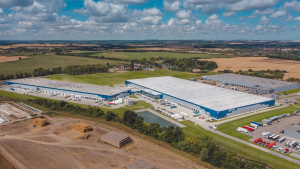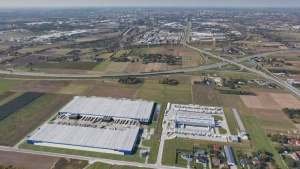
Retail investor EPP has recently delisted from the Johannesburg and Luxembourg stock exchanges and announced the sale of certain assets. Tomasz Trzósło, CEO of EPP talked to Property Forum about the rationale behind these decisions, the impact of the war in Ukraine on the Polish retail market and its overall condition in the new, post-pandemic era.
In the given circumstances, my first question is rather obvious – how will the Russian invasion of Ukraine affect the retail market in Poland in the long run?
The war in Ukraine is the second significant challenge the retail industry in Poland faces in the short term. The sector has just begun to recover from COVID-19 pandemic that had significantly affected the shopping centres results not only through lockdowns and legislation abolishing rental obligations during closures but also caused temporal changes in consumer behaviour such as fewer interactions in public places driven by safety concerns.
Right now ,the attention of all of us, including our customers, has shifted to the daily news about the war, the global situation, and above all to the tragedy of inhabitants of Ukraine. It is not only affecting our minds, as people feel entertainment as inappropriate when human tragedies are happening daily next door, but also the household budgets. With rising energy, gas and fuel prices, high inflation, increasing interest rates and fluctuations in the value of our currency partly reinforced by the war, we can expect that Poles, having less money left in their wallets, will have to focus on securing their basic needs first, including the cost of accommodation and bills. Therefore they may limit their shopping expenses. On the other hand, at the moment we have more than a million new potential customers from Ukraine. They will need to buy food, clothes, and other goods. Additionally, due to low unemployment in Poland, some of them will quickly find work and will have shopping budgets.
We do hope for a quick end of the war but it will echo in retail real estate results for some time. It should not affect occupancy rates, however, some of the retailers present in the Polish malls that had operations in Russia have suspended their presence in that country which may have an impact on their global revenues and expansion plans. There may also be product shortages due to disruption of supply chains.
One of the first effects of the war across our Eastern border is the return of Ukrainian workers to their home country…
In January 2022, the unemployment rate in Poland has already fallen to a historic low 2.8%, which was the second-lowest unemployment rate in the EU. At the moment, almost every industry is experiencing employee shortages, but the most difficult situation is in the industry in general, logistics and construction. The border guards have already reported approx. 130,000 Ukrainian men who have returned to their home country, including approx. 80,000-100,000 just from Poland. To give some perspective: according to the Ministry of Family and Social Policy, in 2021, there were close to 400,000 Ukrainians working for Polish construction companies. With the departure of Ukrainians leaving Poland to fight for their country the demand for workers in industries employing men will increase.
On the other hand, the vacancies are also present in a great number in the service, retail or hospitality sectors which could pose a chance for Ukrainian females who, together with children, are the biggest group of refugees arriving in Poland. Some of them want to move further west, but migration experts say approx. 60-70% would like to stay in Poland. It is estimated that within the next few months, the Polish labour market could take in even 700,000 workers from Ukraine. In the retail sector itself at the moment there are approx. 150,000 vacancies.
The Polish government already ensured legislation that gives the possibility to provide refuges with medical care, a PESEL number (Universal Electronic System for Registration of the Population), and with such PESEL number ability to start working in Poland. Now the key is to provide childcare so that mothers from Ukraine can work. I am very heartened to see that Polish business is keen to show its support for Ukraine and started offering jobs to the people fleeing the war. At EPP, we are also promoting job opportunities for Ukrainian professionals available at our properties and introducing projects that include the provision of childcare in our facilities to meet their immediate care needs.

Tomasz Trzósło
CEO
EPP
How is EPP supporting the Ukrainian community in Poland?
At first, we checked with our direct employees who have roots in Ukraine and offered them support, e.g. to evacuate their relatives and bring them to locations in Poland. We also organised similar assistance to employees who provide cleaning or security services at our properties. It was even possible to find employment for their relatives in our shopping centres.
The needs of the Ukrainian community are constantly changing, so the ways of support have to be updated to make sure that provided help is the most efficient. EPP’s support is focused on four areas. Our first wave of aid was directed to Zamość, where we have our shopping centre Galeria Twierdza. This location, very close to the border with Ukraine, is an important place for refugees’ reception. So far, we have helped with accommodation equipment and transportation. We also provided the most necessary medical supplies for hospitals in Nowowolynsk, a town in Ukraine near Zamość. We also set up an information point in our shopping centre in the Ukrainian language helping refugees. The second area includes locally distributed help with our shopping centres as satellites to assist Ukrainians or aid being sent to Ukraine. Our shopping centres and offices have been collecting material aid for refugees and providing space at our properties for the storage of collected products. The third way of engagement is participating in the Polish real estate initiative #Property4Ukraine. Our company is among several entities involved in providing shelter for refugees from Ukraine thanks to which a total of 3,000 persons will be accommodated in vacant office buildings adapted to housing needs. Last but not least area – our employees expressed interest in helping out at refugee aid posts, so we enabled that as part of the EPP employee volunteer program adding additional paid days for this purpose.
How are EPP retail centres in Poland performing in the pandemic conditions in terms of footfall?
We noticed a quick recovery of footfall levels after the last lockdown in May 2021. After months of closures and lockdowns, people were thirsty for interaction, shopping, entertainment, or eating out. Currently, we are at the footfall rate of approx. 80% of 2019 levels. The COVID-19 pandemic has undoubtedly influenced the consumers' habits – shopping nowadays is more purposeful, and customers, thinking about safety and planning, shop mostly alone, and go to shop less frequently but spend more each time. Additionally, until the end of February, we had customer limits in shopping centres in Poland, which, fortunately, with the slowdown of the fourth pandemic wave, have been lifted. With the epidemic situation stabilised, we expect footfall to return to pre-pandemic levels in the coming months. We will certainly support this return with activities at our shopping centres.
What is the current stance of banks regarding the financing of new, large retail projects?
Poland is the only country in Europe where, as a result of the pandemic, broad legislation was introduced to fully exempt tenants from paying rents and service charges to landlords during lockdowns. This legislation profoundly affected not only the relations between tenants and landlords but also the banking sector. Owners and property managers of shopping centres, deprived of revenues from rents, were forced to postpone the repayment of loans worth millions of euro. Legislative rent arrangements caused banks to be more cautious in granting loans for financing the new and existing retail projects and resulted in a deterioration of the conditions on which loans were granted. This was one of the factors why EPP had to be delisted and restructure its portfolio. We sold a significant amount of assets by creating two joint ventures (Horse JV comprised of 9 M1 shopping centres and 2 retail parks, and Community Properties JV consisted of 11 shopping centres and 3 office properties) and signed preliminary sale agreements for Towarowa 22 and Power Park Opole with plans to exit from both of these assets entirely. These were not easy decisions, but in a pandemic reality they were unavoidable. The portfolio restructuring and sales allowed us to raise funds to repay our credit obligations while keeping the management of the majority of our assets in our hands. As a result, the size of our first-class team and market position have not changed. So secured, we can fully focus on operations and developing our business going forward.
How is the development of Towarowa 22, a joint-venture with Echo Investment progressing?
In February 2022 EPP entered into a preliminary sale of shares agreement to dispose of our stake in the Towarowa 22 project in Warsaw. The disposal is in line with our strategy to deleverage our business through selling non-core assets. The transaction will allow us to improve our debt ratios and repay some of our credit obligations.
E-commerce: traditional retail-killer or a forced collaborator?
E-commerce tends to be considered as a villain to brick and mortar. However, the simultaneous use of two channels – online and offline – allows taking advantage of synergies. After all, it's not rare for a customer to start shopping online and end up in a shopping centre. It can also be the opposite – the customer gets acquainted with the product and the brand in a store and then makes a purchase online. That's why a well-structured omnichannel strategy is so important.
I think the need for traditional shopping and interaction with a physical product is still very strong and this will not change easily. The forecasts for retail in Poland predict a steady growth of e-commerce, but even with a good pace, in 2025 still 80-90% of purchases will be made in brick-and-mortar stores. They will be needed to build brand identity and play an important part in the holistic customer experience. For example, the young generation of shoppers who were “born with a smartphone” still like to visit traditional shops for the reasons like trying on clothes and interacting with a physical product, as well as the availability of additional services such as professional advice or styling.
Of course, e-commerce, the use of new technologies, the Internet and social media have developed dynamically during the pandemic and have influenced consumer behaviours. Therefore it is important for shopping centres to adapt to the new conditions, especially in terms of their communications aimed at a more digitally savvy consumer. It is essential to look for new points of contact with the consumer, i.e. to be present also where the customer seeks information and buys online. I am in favour of an approach that leverages new technologies to meet the needs of today's consumers. That is why we are also implementing an omnichannel approach in our shopping centres including supporting debuts of new omnichannel concepts, those which can creatively combine online and offline environments with a goal to surprise and inspire customers.
For the end, a little bit of fortune-telling: how will the Polish retail market in Poland look like in the next 12 months?
Nowadays, more than ever we could use the help of a fortune-teller. The rising inflation and the growing cost of a consumer basket, all the market uncertainty due to war, possible new waves of COVID-19 make it difficult to predict the future. For sure we will be challenged with increasing costs of running a business. On the other hand, the market should be reinforced with the labour pool and parallelly – the purchasing power coming from Ukraine. I'm expecting shopping centre turnover performance to reach pre-pandemic levels in 2022. It is important to continue rebuilding footfall and regaining financial stability, also through cooperation with banking institutions, as well as allow business to operate sovereign from the politics and governmental rapid regulatory changes.
The prevailing trends in the retail market are omnichannel solutions, stronger cooperation with local communities, and sustainability and green topics. The retail industry is expected to continuously become more eco-friendly. Retailers naturally in possession of a wide range of tools can play a trendsetter role in spreading a sustainable lifestyle. This is the direction EPP has been heading and implementing consistently in our properties. We manage our real estate in accordance with the principles of sustainable development supporting better resource management. In terms of local engagement and inclusion in 2021, we launched a community-oriented project – “5 good deeds for the 5th anniversary of EPP” and carried out actions across all of our shopping centres such as providing special conditions for highly sensitive persons or introducing pets to our facilities. With this, we strengthen our ties with customers and users of our assets. It is also an important part of our environmental, social and governance (ESG) approach, which is a vital pillar of EPP business strategy. Our first ESG report with a presentation of the initiatives undertaken and an indication of the KPIs will be published this spring.



